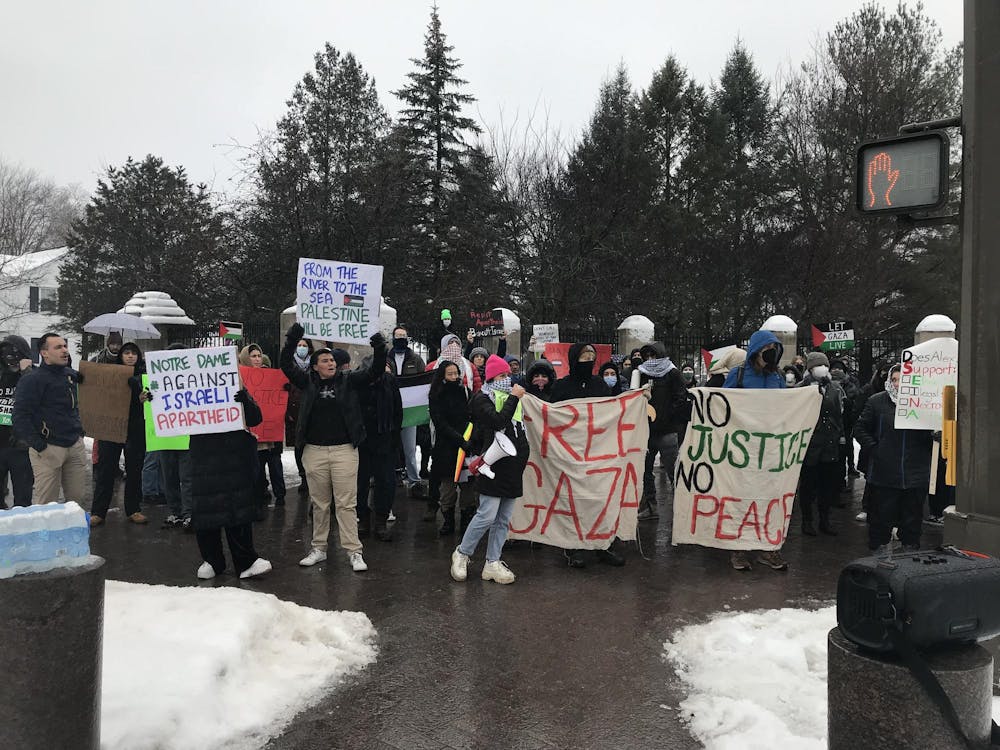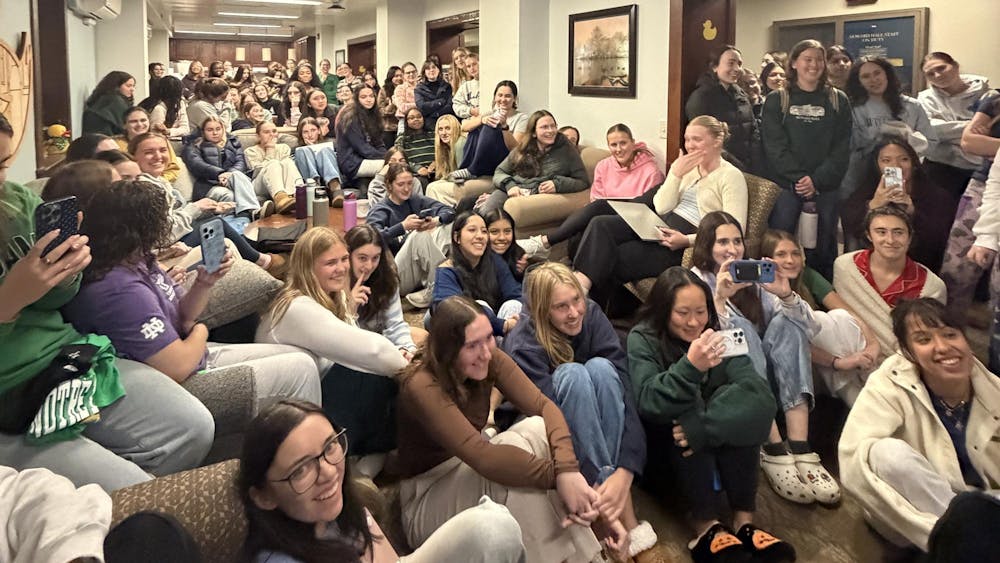As U.S. Supreme Court Justice Amy Coney Barrett was preparing to speak in Eck Hall of Law Tuesday, approximately 100 protestors assembled by campus’s main entrance to express disappointment that the University invited Israel Supreme Court Justice Alex Stein to participate in a conversation with Barrett, who was appointed to the highest court in the nation 23 years after graduating first in her class at Notre Dame Law School.
The conversation between the justices in the McCartan Courtroom was closed to the media and those outside the law school community. The closed nature of the event did not prevent outrage.
In an open letter to the law school in the Irish Radical Saturday, more than a dozen local groups including Student Voices for Palestine, Michiana Friends of Palestine and Black Lives Matter South Bend said Notre Dame should be using its platform to advocate for the protection of all innocent life — not give a voice to an “oppressive” government that is currently being tried by the United Nations for war crimes.
The open letter argued that since the State of Israel’s founding in 1948, the country’s judicial system has upheld discriminatory laws that directly enforce an “apartheid system” on Palestinians. It added that Stein has “directly facilitated” the forcible transfer of indigenous Palestinians in occupied territory to make way for Jewish settlements, such as Khan al-Ahmar and Masafer Yatta.
“Alex Stein’s presence on campus in light of the ongoing genocide and violence in Palestine being enacted by the Israeli government for whom he serves is extremely inappropriate,” the letter said.
In addition to chanting that there will not be peace in the Holy Land until justice is achieved, protestors said that Palestine will be free “from the river to the sea” and called on Yemen to make them proud and “turn another ship around.”
The protest began at 11:30 a.m., an hour before Barrett and Stein took the stage in the law school. Protestors marched along Angela Boulevard between Notre Dame Avenue and Eddy Street carrying signs, beating drums and passing out black N95s and ponchos.
Vint Thawra, a protester with Michiana Friends of Palestine, said Notre Dame needed to be held accountable for the political stances it makes explicitly and implicitly.
“Notre Dame can constantly make these grand gestures like Walk the Walk Week, where they’re paying homage to their grand civil rights legacy and all of that,” Thawra said. “But in reality, they’re holding job fairs with people like Lockheed Martin. They’re inviting an architect of apartheid, Alex Stein, to have a conversation with the U.S. Supreme Court justice. And to me, that is only an explicit approval of what’s going on overseas.”
Graduate student Seham Kafafi, who is involved with Student Voices for Palestine, said the club needed to rely on outside local groups to speak up about Palestine.
“There has been some silencing going on on campus,” Kafafi said. “Student Voices for Palestine wanted to do an information display board next to the law school, and they wouldn’t let us.”
According to an Associated Press report, the Health Ministry in the Gaza Strip said Sunday that the Palestinian death toll from the war between Israel and Hamas has soared past 25,000. Kafafi said people in Gaze were dying “systematically” and that genocide was taking place.
“Israel has committed untargeted airstrikes and bombings of civilians, including women and children,” Kafafi said. “The medical system has fallen apart. They’re bombing universities, refugee camps, hospitals — you name it.”
Law student Turner Koch, who attended the conversation between the justices, said Barrett and Stein concentrated on legal issues, avoiding controversial topics like the Israel-Hamas war.
“It focused a lot just on issues of statutory interpretation,” Koch said. “It was an awful lot right all at once. We opened with questions around originalism versus purposivism — big questions about how courts should interpret the law. But also they dove into what makes a good judge.”
Stein discussed “holes” in Israel's constitution that need to be patched and compared the founding of the United States with the founding of Israel 75 years ago, Koch added.
Barrett taught law student Nate Wertjes’ legislation and regulation class on Monday.
“She primarily taught statutory interpretation when she was a professor here, and so we were really honored to have her come and teach through the material,” Wertjes said. “It’s clear that she was a wonderful professor while she was here.”
Wertjes added that he thought Notre Dame’s decision to invite Barrett and Stein to campus shows that the University is committed to free speech and free inquiry.
“It’s one of the reasons why I’m proud to be a law student here because even if there are protesters out on the street, Notre Dame is willing to host them,” he said. “So I think that is a good thing.”










